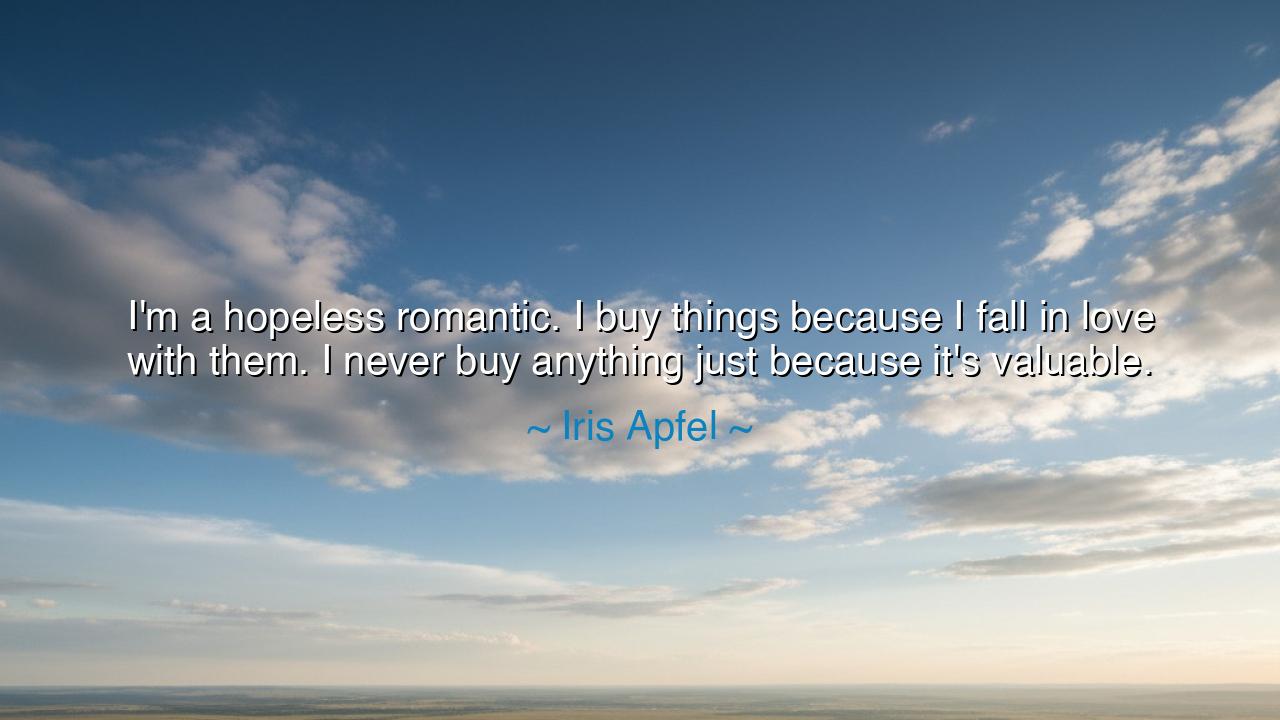
I'm a hopeless romantic. I buy things because I fall in love with
I'm a hopeless romantic. I buy things because I fall in love with them. I never buy anything just because it's valuable.






In the words of Iris Apfel, the grand dame of style and spirit, there is a teaching that strikes to the heart of value itself: “I’m a hopeless romantic. I buy things because I fall in love with them. I never buy anything just because it’s valuable.” Here, she speaks not merely of possessions, but of the way one should live—led not by cold calculation, but by passion, by beauty, by the fire of the heart that recognizes meaning where others see only price.
The ancients too knew this truth. They told of Helen of Troy, whose beauty was said to be worth more than kingdoms, and yet it was not her “value” that launched a thousand ships, but the passion she awakened in others. True worth, they taught, is never measured in gold or number, but in the way something stirs the soul. Thus, when Apfel proclaims herself a hopeless romantic, she aligns with this ancient wisdom: it is better to live by affection and wonder than by the sterile weight of coin.
To fall in love with an object is to see beyond its surface. The romantic spirit does not ask, “How much is it worth?” but “What does it make me feel?” A bead of glass, a scrap of fabric, a forgotten relic in a marketplace—if it sings to the soul, then it possesses a treasure greater than diamonds. Apfel reminds us that to live this way is to fill life with stories rather than investments, with memories rather than appraisals. The object is not important for resale, but for the way it lights a fire within.
History provides its witness. Consider Vincent van Gogh, who painted with passion though his works sold for little in his lifetime. He was not guided by the value others placed upon his art, but by the love he felt for color, for movement, for the trembling beauty of the world. Today, his canvases are worth fortunes, yet their true worth was always present—in the spirit of the man who painted them, regardless of recognition. His life mirrors Apfel’s truth: it is love, not value, that gives an object its eternal soul.
The deeper meaning of Apfel’s words is this: to be a hopeless romantic is not to be naïve, but to be free. The one who buys only by “value” becomes enslaved to markets and opinions; the one who buys by love becomes rich in joy, rich in authenticity, rich in the personal connection that no appraisal can touch. The hopeless romantic lives in a world of wonder, while the calculating mind lives in a world of numbers.
The lesson is clear: live by the heart’s compass. Do not measure all things by what others call valuable. Instead, seek what awakens affection in you—whether it is a book, a song, a simple ornament, or even a fleeting experience. If it fills you with delight, it is treasure enough. And when your life is filled with such chosen loves, it will be richer than the vaults of kings, for it will be rich in meaning.
Therefore, O listener, be unashamed in your romantic way of seeing. Fall in love with colors, with objects, with moments. Do not wait for the approval of markets or the judgment of experts. If it sings to your soul, it is yours; if it fills your life with beauty, it is priceless. In this way, you will weave a life of treasures that shine brighter than gold—for they are treasures of the heart, which never lose their value.






AAdministratorAdministrator
Welcome, honored guests. Please leave a comment, we will respond soon